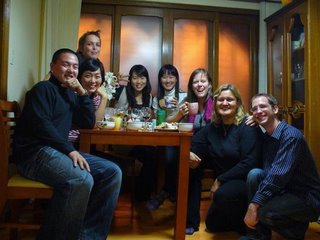SYLLABUS
Hansung University, English Department
ECW- English Communication and Writing; Instructor: Bianca Brankica Turalija
Winter ’06-‘07
Email:
biancatur@rocketmail.com or
110558@hansung.ac.krMSN:
biancatur2@hotmail.comTel. 760-4398 // Cell: (011) 1762-1967
Office: Professors Building, Room 824
My blog:
http://magistragrande.blogspot.comGeneral Description of the Course
To successfully complete this course, you must have:
a) Textbook: Writing from Within, by Curtis Kelly and Arlen Gargagliano. Cambridge University Press, 2001.
b) A blank A4 Size notebook
c) A range of pencils and pens, erasers, etc,. – it’s a writing class!
The majority of Korean students find writing in English the hardest aspect of their language learning efforts. The problems start immediately at the sentence level with students not being able to express their thoughts in grammatically and syntactically correct sentences. Subsequently, there are difficulties in stringing the sentence into comprehensible and cohesive paragraphs, and ultimately larger compositions/ ssays.
How to solve this problem, then? Simply: by teaching students how to organize their thoughts in writing, starting from the sentence and moving onto more complex segments of text. The objective of this course is to teach students how to generate topics, how to write cohesive sentences and paragraphs and how to organize them in logically connected expository compositions. “Expository” simply means something that describes or explains. The kind of writing I am aiming to teach you is the kind you will have to do in both academic and business environments.
Anyone can learn to mimic models: if you’re taught how to write an invitation card, you can more or less mimic it successfully. However, if you want to be a truly good writer in English, you need to go beyond that. Excellence in writing comes from within, from your own thoughts and feelings, and leads to discovery of self, of others and the world around you. Activities that we will do in this class will encourage you to use your creativity, to think, and most importantly to have fun with writing.
The focus of each unit is one writing assignment. Some assignments are introspective – they force you to think about yourself (e.g. a major event in your life), others are more practical (e.g. you’re asked to plan a trip abroad, or write a magazine article). I am hoping to provide a variety of expository modes of writing and a wide range of writing experiences. Before tackling your composition assignment, I will teach you the basics, and you will start writing in class, finishing at home if necessary. The basics include the pre-writing activities (brainstorming, paragraph analysis, organizational practices, model analysis) and post-writing activities (editing, giving feedback, and optional writing).
Don’t forget: writing is a skill and IT CAN BE LEARNED. In the words of the textbook authors: “learning to write is like learning how to play a musical instrument- the more you practice the better you’ll be.” Also, remember, good writers are necessarily avid readers, so the more you read the better you’ll write.
2. Grading policy
Hansung University follows the ‘bell curve’ grading system. Simply put, you are competing against one another. Please, remember that when it comes to grading, what you give is what you get. If you are not putting in the maximum effort, you cannot expect to get the highest grade.
Official university policy dictates that each class be graded accordingly:
A= 30% of the class
B= 40% of the class
C,D,F, = 30% of the class
3. In class grading will be as follows:
Attendance and Participation: 10 %
Homework and Journal= 40%
Mid-term Written Exam ( 10% ) and Final Written Exam (10%) = 20%
Mid-term Written Assignment (10%) and Final Written Assignment (20%) = 30%
4. Attendance policy
The rule is very simple: your regular and on-time attendance is a must.
Two lates count for one absent; five absents will land you the final grade D, regardless of your performance in any other aspect of this course; more than 5 absents will result in an automatic failing grade F. You will be excused for illness or family emergency in which case you need to call me in advance and later supply a written proof (a doctor’s note or a signed letter from a parent or guardian). Bear in mind that attendance and participation go hand-in-hand and combined they count for 30% of your final grade.
5. Courtesy and the Rest
I do not tolerate the use of cell phones during the class. Please, switch them off. If I see you using your phone during the class, I will give you an absent.
Only English is allowed during the class. The rule: K+K= A. Each time you use Korean, you and your partner(s) will get a K. Two K’s will land you an absent.
*********************************************************************************
ASSIGNMENTS:
ECW- ASSIGNMENTS SHEET
Hansung University, English Department
Instructor: Bianca Brankica Turalija; Winter ’06-‘07
Each student in this class is required:
1. to hand in regularly assigned homework in addition to two diary-type compositions.
2. complete and submit two written assignments, based on the writing learned and practiced in the class.
1. Diary: 1st due Dec. 22nd /// 2nd due Jan. 5th.
One of the best ways to practice writing is keeping a journal. For this course, you are required to submit two 20-sentence (about half a page, handwritten) diary-type compositions. You should write about anything interesting that you did (good or bad), witnessed, read or heard about; the most interesting person you met; anything that strikes you as worth writing about.
2. 1st Written Assignment. Typed. Due Date: Jan. 2nd . Submit in Class.
You are required to type a 1 page, double-spaced composition. The 1st assignment must have an introductory paragraph, three body paragraphs and a short conclusion. You have a choice between the following two topics: :
a) A major event in my life / An event that changed my life (based on Unit 5)
If you think hard, I am certain you will find a moment or a day that has changed your life or you forever. It could be something sad, like losing a loved one, breaking up with a partner, not passing a test, or something joyous like falling in love, getting a high TOEIC score, winning a lottery (why not? – it happens), etc.
b) A guidebook article about the one-day tour you planned. (based on Unit 6).
For this assignment you will research a popular tourist city, plan a perfect day tour and write an article about it in a guide-book style.
3. 2nd Written Assignment. Typed. (20% of your final grade). Due Jan. 9thth. Submit in class.
Your second assignment is also a 1-page, double-spaced five-paragraph composition. The assignment must have an introductory and summary paragraph, as well as three paragraphs in the body of the composition.
You have a choice between two topics:
a) A restaurant review (based on lesson 7).
You will have to describe the décor and atmosphere inside a restaurant of your choice, the quality of service and food there, its best and worst features, any other comments. Make sure that you use many descriptive words.
b) An important person that influenced me.
You are going to write a composition about a person that influenced you. In the introductory paragraph you will introduce this person: who (s)he is, what (s)he does, what is his/her relationship to you. In the concluding paragraph you will say how your life would be different without this person. Body paragraphs might deal with any of the following: positive characteristics of this person, what you learned from this person, which problems this person helped you solve, an incident that shows why this person is very important to you, etc.
*******************************************************************************
OUTLINE:
Dec. 18th
General Introduction to the Course
Dec. 19th
Writing basics: Sentences, Paragraphs, Compositions, Conjunctions, Punctuation
Dec. 20th
Unit 1: About me
Brainstorming. General and specific information. Topic Sentence. Paragraph Format
Dec. 21
Unit 2: Career consultant
Organizing ideas logically into a paragraph
Dec. 22
Unit 3 : A dream come true.
Christmas around the world
1st Journal Entry DUE
Facts and examples paragraph style. Supporting sentences
Dec. 25
Christmas Holiday, No class
Dec. 26th
Unit 5. It changed my life
Cause and effect paragraph style. A major event in life.
Dec. 27th
Unit 6: Exciting destinations
Process Style paragraph. A guide book article about a one-day tour
Dec. 28th
Unit 7. Research survey
Classification style paragraph. Restaurant review
Dec. 29th
Mid-Session Exam written exam (2 hours)
Jan. 1st
New Year’s Day Holiday: No Class
Jan. 2nd
Unit 8: The power interview
1st Written Assignment
Compare and contrast paragraph style.
Jan. 3rd
Unit 9. Personal goals.
Persuasive paragraph style.
Jan. 4th.
Unit 10. Architect.
More about organization of the paragraph
Jan. 5th
Unit 11: My role models
2nd Journal Entry
A composition about an important person in my life
Jan. 8th
.Unit 12: Be a reporter
Writing a newspaper article
Jan. 9th.
2nd Written Assignment Due
The course review and preparation for final written exam.
Jan. 10th
Final Written Exam (2 hours)




































